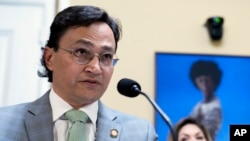The Cherokee Nation of Oklahoma moved a step closer on Wednesday to having a promise fulfilled from nearly 200 years ago that a delegate from the tribe be seated in the United States Congress.
Cherokee Nation Principal Chief Chuck Hoskin Jr. was among those who testified before the U.S. House Rules Committee, which is the first to examine the prospect of seating a Cherokee delegate in the U.S. House of Representatives. Hoskin, the elected leader of the 440,000-member tribe, put the effort in motion in 2019 when he nominated Kimberly Teehee, a former adviser to President Barack Obama, to the position. The tribe's governing council then unanimously approved her.
Right goes back to 1835
The tribe's right to a delegate is detailed in the Treaty of New Echota signed in 1835, which provided the legal basis for the forced removal of the Cherokee Nation from its ancestral homelands east of the Mississippi River and led to the Trail of Tears, but it has never been exercised. A separate treaty in 1866 affirmed this right, Hoskin said.
"The Cherokee Nation has in fact adhered to our obligations under these treaties. I'm here to ask the United States to do the same," Hoskin said to the panel.
Hoskin suggested to the committee that Teehee could be seated as early as this year by way of either a resolution or change in statute, and the committee's chairman, Massachusetts Democratic Rep. James McGovern, and other members supported the idea that it could be accomplished quickly.
"This can and should be done as quickly as possible," McGovern said. "The history of this country is a history of broken promise after broken promise to Native American communities. This cannot be another broken promise."
'We should be treated as siblings'
But McGovern and other committee members, including ranking member Republican Rep. Tom Cole of Oklahoma, a citizen of the Chickasaw Nation, acknowledged there are some questions that need to be resolved, including whether other Native American tribes are afforded similar rights and whether the Cherokee Nation of Oklahoma is the proper successor to the tribe that entered into the treaty with the U.S. government.
McGovern said he has been contacted by officials with the Choctaw Nation of Oklahoma and the Delaware Nation, both of which have separate treaties with the U.S. government that call for some form of representation in Congress. McGovern also noted there are two other federally recognized bands of Cherokee Indians that argue they should be considered successors to the 1835 treaty: the United Keetoowah Band of Cherokee Indians in Oklahoma and the Eastern Band of Cherokee Indians based in North Carolina, both of which reached out to his office.
The UKB selected its own congressional delegate, Oklahoma attorney Victoria Holland, in 2021. Holland said in an interview with The Associated Press that her tribe is a successor to the Cherokee Nation that signed the 1835 treaty, just like the Cherokee Nation of Oklahoma.
"As such, we have equal rights under all the treaties with the Cherokee people and we should be treated as siblings," Holland said.
Only a few Native Americans serve in Congress, including Cole and Republican Rep. Markwayne Mullin, a citizen of the Cherokee Nation who was elected this month to represent Oklahoma in the U.S. Senate, where he will become the first Native American in that body in nearly 20 years.
"As a member of the Cherokee Nation, I firmly believe the federal government must honor its trust and treaty responsibilities to Indian Nations," Mullin said in a statement. "We are only as good as our word."
Members of the committee seemed to be in agreement that any delegate from the Cherokee Nation would be similar to five other delegates from the District of Columbia, Guam, the Commonwealth of the Northern Mariana Islands, American Samoa and the Virgin Islands. These delegates are assigned to committees and can submit amendments to bills but cannot vote on the floor for final passage of bills. Puerto Rico is represented by a nonvoting resident commissioner who is elected every four years.




